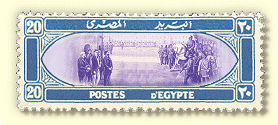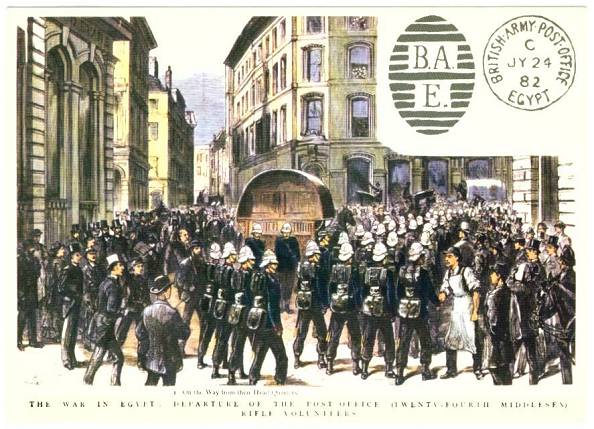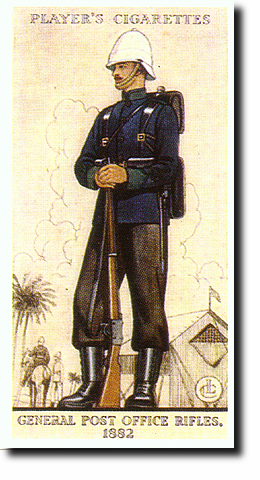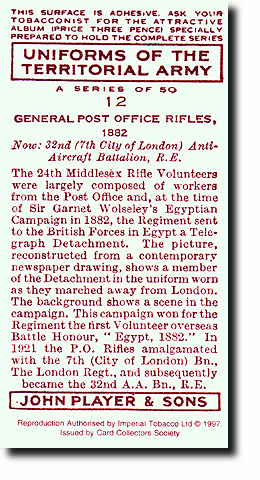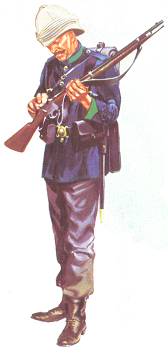 The Egyptian campaign came at an interesting time for the British Army, becoming the first major conflict after the implementing of the Army Reforms of 1870-1881 by Edward Cardwell, Secretary of State for War and a former soldier.
The Egyptian campaign came at an interesting time for the British Army, becoming the first major conflict after the implementing of the Army Reforms of 1870-1881 by Edward Cardwell, Secretary of State for War and a former soldier.
The failures of the army had started to become apparent during the Crimean War, when W. H. Russell of The Times reported extensively and critically on the poor logistics and command system, led by many aristocratic officers who were completely inept. The Indian Mutiny (1857) reinforced the fact that the army was inefficient despite the bravery of the soldiers. With the efficiency of the Prussian army over Austria in the Seven Weeks War (1866) and over the French in the Franco-Prussian War (1870-71) it was clear that a professional and effective military army would be needed in future wars.
Under Gladstone the policy was to attack privilege and inefficiency so Cardwell, War Secretary between 1870 and 1874, embarked on a much-needed reform of the British Army.
The purchase of commissions was abolished; the selection and promotion of officers was to be by merit rather than money and influence; the Commander-in-Chief was made subordinate to the Secretary for War; the Army Enlistment Act fixed the term of enlistment to 12 years, part on active service, part on reserve. Before this, enlistment was for life. The length of service overseas was limited to six years, followed by six years in the reserve. The Martini-Henry breech-loading rifle was introduced as the main weapon of the infantry. Perhaps one of the most dramatic reforms was the introduction of a system of named regiments, for example, the York & Lancs, the Worcestershires etc.
Among the reforms was the importance given to mail for the troops: it was seen as important to the morale of the forces, a tradition that continues today. The Crimean War was the last time civilian postal staff were sent into the field with the British Army. To over come the difficulties encountered at that time, and also to reduce costs, a committee chaired by Colonel Robert Biddulph, the Assistant Adjutant General, was established by the Secretary of State for War to consider the formation of a "Corps for the performance of Postal Duties with an Army in the Field". In its report, dated 28 February 1877, the committee recommended that such a Corps should consist solely of men trained to the duties of the Post Office and that its nucleus should be the members of the 49th Middlesex Rifle Volunteers. It was common practice at this time for groups of trades to form volunteer battalions and on its formation the 49th had been created as a standard rifle battalion and not with the intention of providing the military postal system. This unit had been formed on 19 February 1868: its officers and men consisted of Post Office employees, who on account of their military training, constituted the ideal body of men to provide a postal service for an Army in the field.
When it was decided in 1882 to send a force to Egypt to restore the Khedive and protect British interests in the Suez Canal, volunteers from the 24th Middlesex (Post Office) Rifle Volunteers were called for on 18 July to enlist in the Army Post Office Corps and serve in the campaign. This was the first use of the new army postal system.
The volunteers had to agree to serve for six years, most of the time being spent on the reserve unless they were required for active service. They retained their positions in the Post Office, and when on campaign received their Post Office salary as well as Army pay. This development provoked interesting responses among the volunteer movement generally, as recorded in the editorial columns of The Volunteer Service Review. In the issue dated 15 August 1882 the journal stated that there was far too much nonsense talked about volunteers embarking on foreign service and that this proceeding had nothing to do with the Volunteer Force as such. A month later it stated that the men are actually regular soldiers at the present time, and will continue so until released from duty. On 15 November the Review repudiated the view held in some quarters that the APOC men had done nothing to earn the campaign medals two of them were shortly to be given by the Queen at a review of the troops returned from Egypt. The rest of the men received their medals on 15 January 1883, the Review pointing out that while they had not taken part in the bayonet change at Tel-el-Kebir they had gone out to take any chances of war which might happen and they dared the dangers of "a climate laden with ills for the present and evil influences for the future".
On 8 August 1882, Captain George Surgeon, Lieutenant Thomas Vial and 43 men sailed for Egypt on The British Prince, reaching Alexandria on 21 August, when an Army Post Office was opened. On the 27th a Field Post Office was opened at Tel el Mahuta and from that date a postal service to and from the front was operated. Once the brief campaign ended in mid-September the APOC men assembled in Cairo, apart from the detachment at Alexandria. On 7 October, leaving behind the six men who stayed to serve the troops remaining in Cairo, Sturgeon and his command left for home, receiving a tumultuous welcome in London on the 24th.
After the nationalisation of the private telegraph companies in 1870, the Royal Engineers provided two companies to assist the General Post Office (GPO) in telegraphy work. This event gave rise to the formation of a Telegraph company raised from the Telegraph branch of the GPO as part of the 49th (later 24th) Middlesex Rifle Volunteer Corps. In 1880 the 49th was renumbered 24th. Sanction was given in 1883 to increase the strength of the company to 200 and that branch of the 24th Middlesex Rifle Volunteer Corps thereafter appeared separately in the Army List as Telegraph Companies. In 1885 the Trained Telegraphists volunteered for service in Sudan with the engineer General Sir Gerald Graham's (1833-1913) expedition force.
On the same campaign the Field Telegraph Corps was accompanied by its sister company, M company (Army Post Office Corps). The Corps of Trained Telegraphists was for administrative purposes named L (or I) Company 24th Middlesex Rifle Volunteer Corps: they were trained by the Royal Engineers and were eventually absorbed into the Royal Engineers in 1908.
The 24th Middlesex Rifle Volunteer Corps, was redesignated 8th Battalion City of London Regiment (Post Office Rifles) in 1908. As the Army Post Office Corps, the company was formed into the Royal Engineers (Postal Section) in 1913. During the First World War (1914-18) it fought with distinction on the Western Front as an infantry unit, having among its number a Victoria Cross winner (Sergeant A J Knight). In the reorganisations that took place between the wars the unit became, in 1935, a Royal Engineers Territorial Anti-Aircraft Searchlight unit - 36th (Middlesex) Battalion of the 28th (Thames and Medway) Anti-Aircraft Group.
|
|
